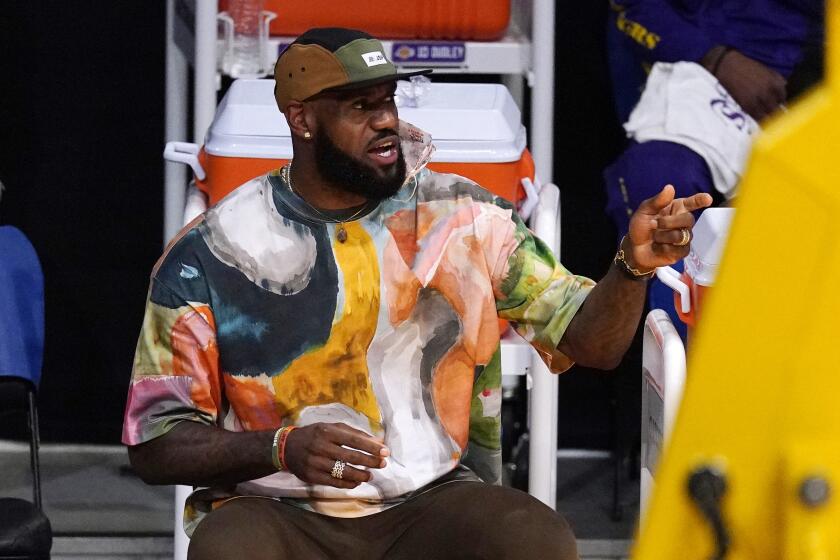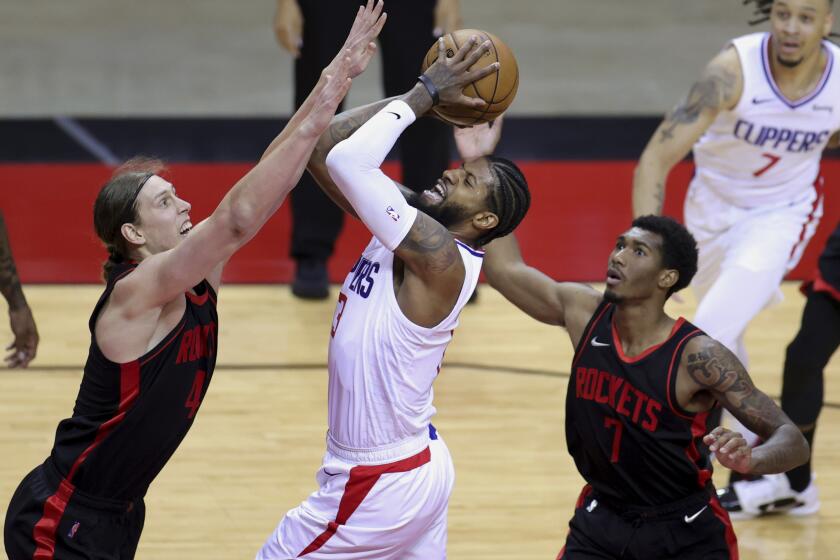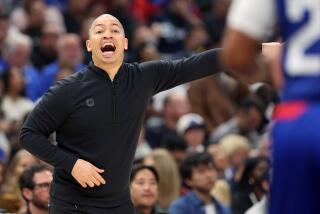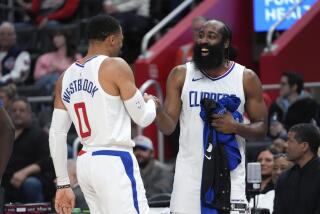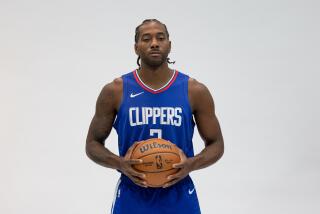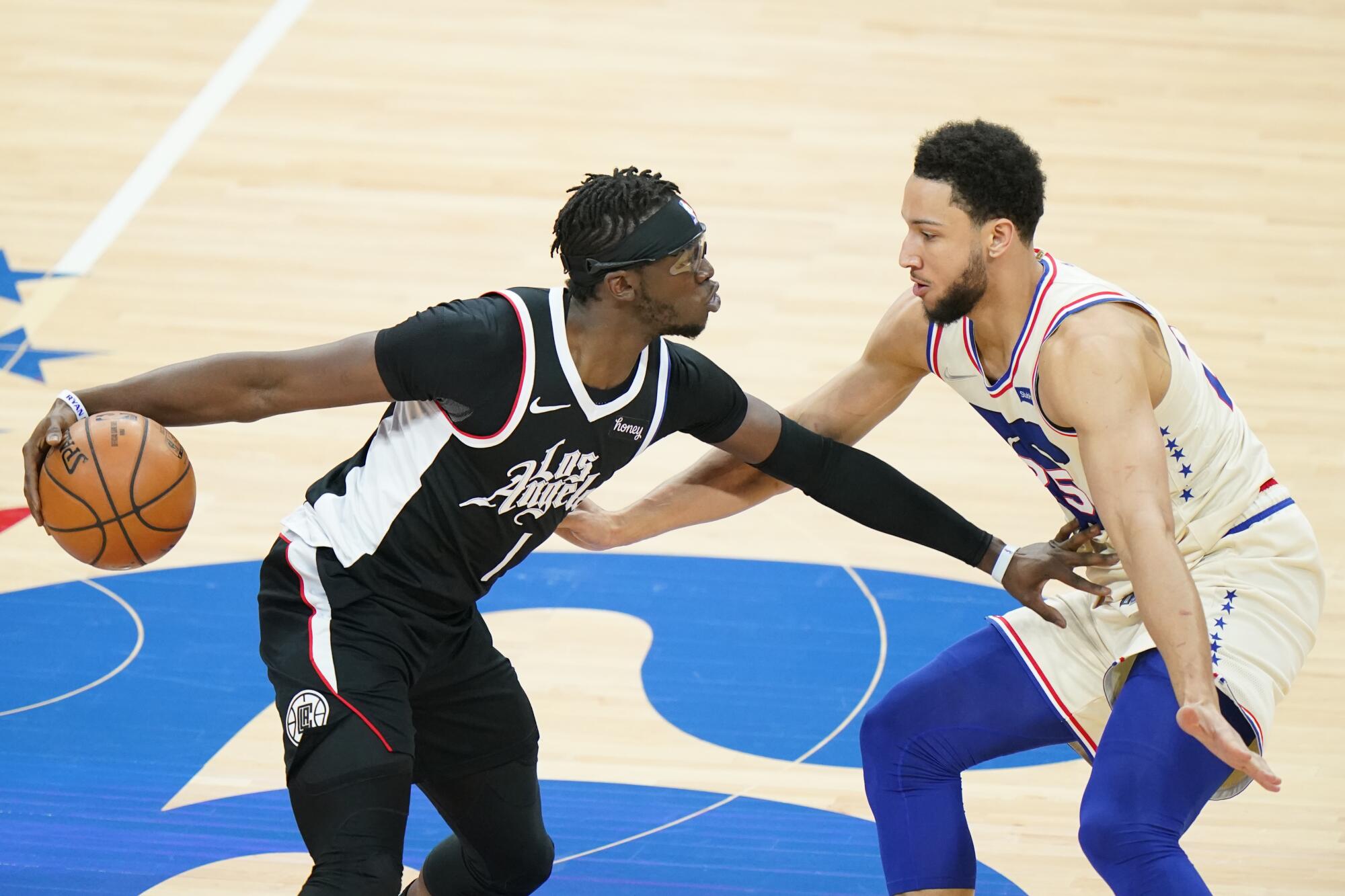
- Share via
Travis Jackson is a believer in doing things for the right reasons. He always has wanted happiness for his younger brother, even more than big scoring nights or winning streaks. And so, an unofficial, annual tradition began. Before each new basketball season started, he would ask Reggie Jackson the same questions.
“Do you want to do this?” he would say. “Do you love this game?”
For Reggie, the youngest of three brothers, the answers were obvious for years. There was little not to love.
He left Colorado in 2008 as the state’s best high school player, and Boston College three years later as a first-round NBA draft pick. At 22, the 6-foot-3 point guard with a bullfighter’s self-belief already had reached the NBA Finals with the Oklahoma City Thunder and called three future most valuable players teammates.
Traded to Detroit three years later, he earned the big contract and starting role he believed he was worth. The Pistons eventually bought out his contract last year and the Clippers acquired him for backcourt depth.
By last September, after an embarrassing postseason collapse left the Clippers looking inward and asking hard questions, their 30-year-old backup guard was doing the same.
The six months he spent with the Clippers had restored confidence in a body that had begun to break down in Detroit, when injuries and doubt first lingered. But his mind remained clouded and answers elusive.
“At the moment, it wasn’t even necessarily a thought that I would be guaranteed to even be playing this year,” Jackson said last month. “That was never guaranteed, to be honest. The unfortunate way that we had lost, it felt like we lost ourselves. And the way things ended for us, it wasn’t necessarily an inevitable decision to come back.”
By October, less than two months before training camp began, offseason training still had not started because of the pandemic.
“My mind was just elsewhere,” he said, “so I’m trying, really, to just get away from basketball.”
One day in October, a few friends persuaded him to pick up a basketball. Dribbles led to shots, which led to a game of knockout. He’d found his answer — a decision that, months later, has helped rejuvenate not only himself, but also the Clippers.
Jackson dialed his brother.
===
Born in Italy to an Air Force family, Jackson followed the local customs in every stop. In England, he learned soccer. While in North Dakota, he played ice and roller hockey. But it was with basketball that his persona, which his brother described as “naturally happy,” shined.
Jackson plays in Nikes that are two colors. He tends to elongate a stride while dribbling upcourt to hang in the air, appearing to skip. Hearing Brooklyn fans say he looked like rapper Bobby Shmurda, Jackson once raised both arms and wiggled his hips in Shmurda’s “Shmoney Dance” style between free throws.
In a league of by-the-book technique, Jackson’s individuality and comfort within his own skin stand out. It translated into confidence even during his first NBA seasons.
After watching Oklahoma City’s run to the 2012 Finals entirely from the sideline, Jackson saw a dynasty unfolding, with him in a central role.
“We were so young and naive thinking it was going to be guaranteed,” he said.
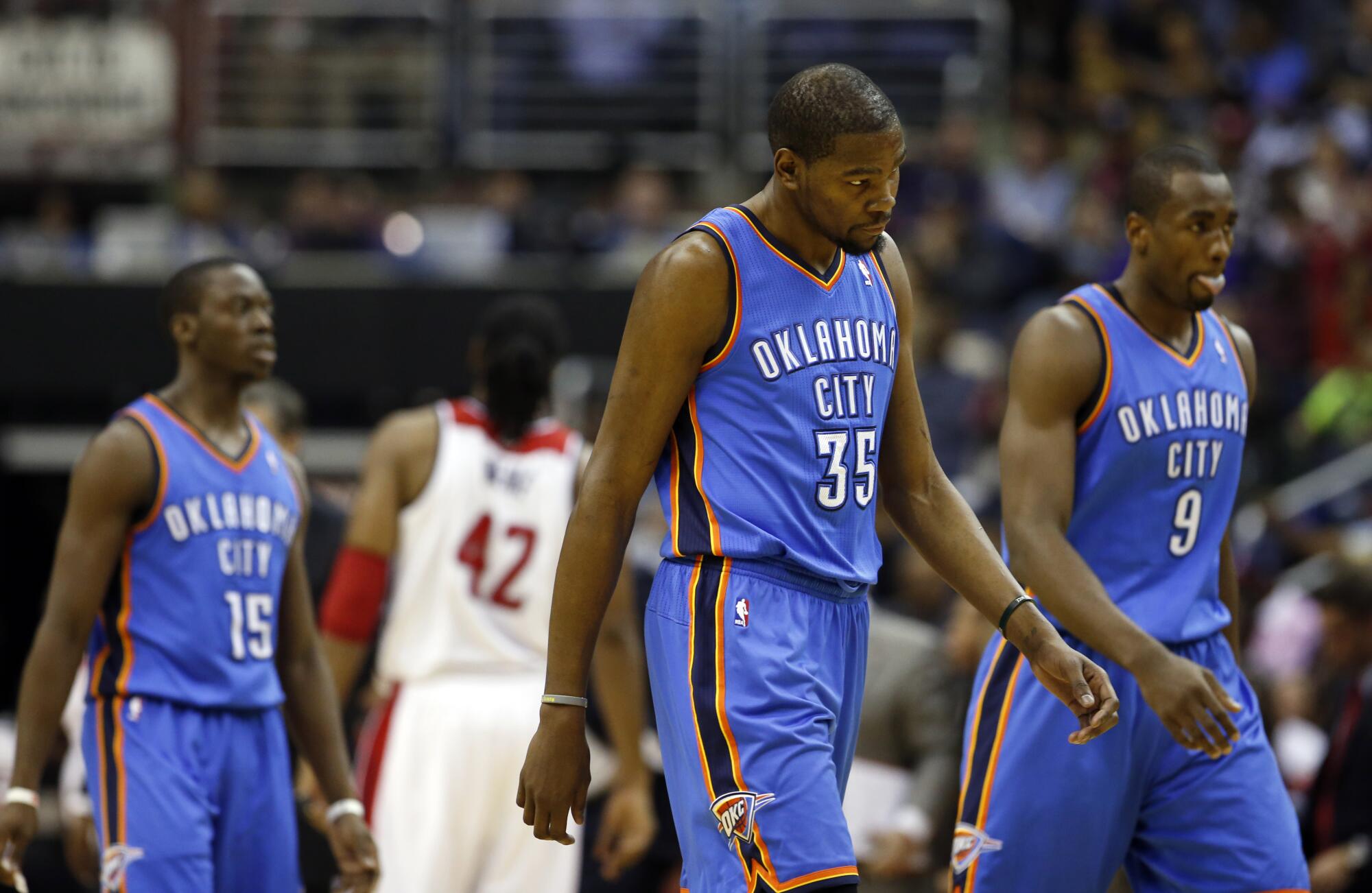
His belief he was best suited to start at point guard in a lineup alongside Kevin Durant and Russell Westbrook, the established ballhandler, bristled some teammates, and when expectations of more Finals runs and a starting job didn’t materialize, a bitter breakup did. He was traded to Detroit in 2015 and some former teammates lobbed barbed comments about his departure to reporters afterward.
Detroit was supposed to be the springboard. He was immediately the everyday starter. Months after arriving, he’d agreed to a five-year, $80-million contract. The Pistons made the playoffs the next season and on the way, saw the happiness his brother knew.
Jackson “lights up a room when he walks in,” Pistons coach Dwane Casey said.
That early promise, and personality, made it all the easier to spot the changes as his five seasons with Detroit unraveled. Knee tendinitis, a sprained thumb and ankle, and a back injury that cost him 42 games in 2019-20, his last season in Detroit, eventually wore him down to a level his brother had never seen.
“It was like we’re hitting the darker days,” Travis Jackson said. “You’re getting that self-doubt. It’s starting to kind of build up.”
Not easily fixed by a surgeon’s scalpel, the injuries tested patience that grew thin as initial timetables for his return flew by.
“Frustrating for everyone around,” Casey said.
“You question if can you do it, if you’re meant to hold up,” Jackson said. “It tested my mental strength. I didn’t know how I felt. I honestly didn’t know how I felt about basketball anymore.”
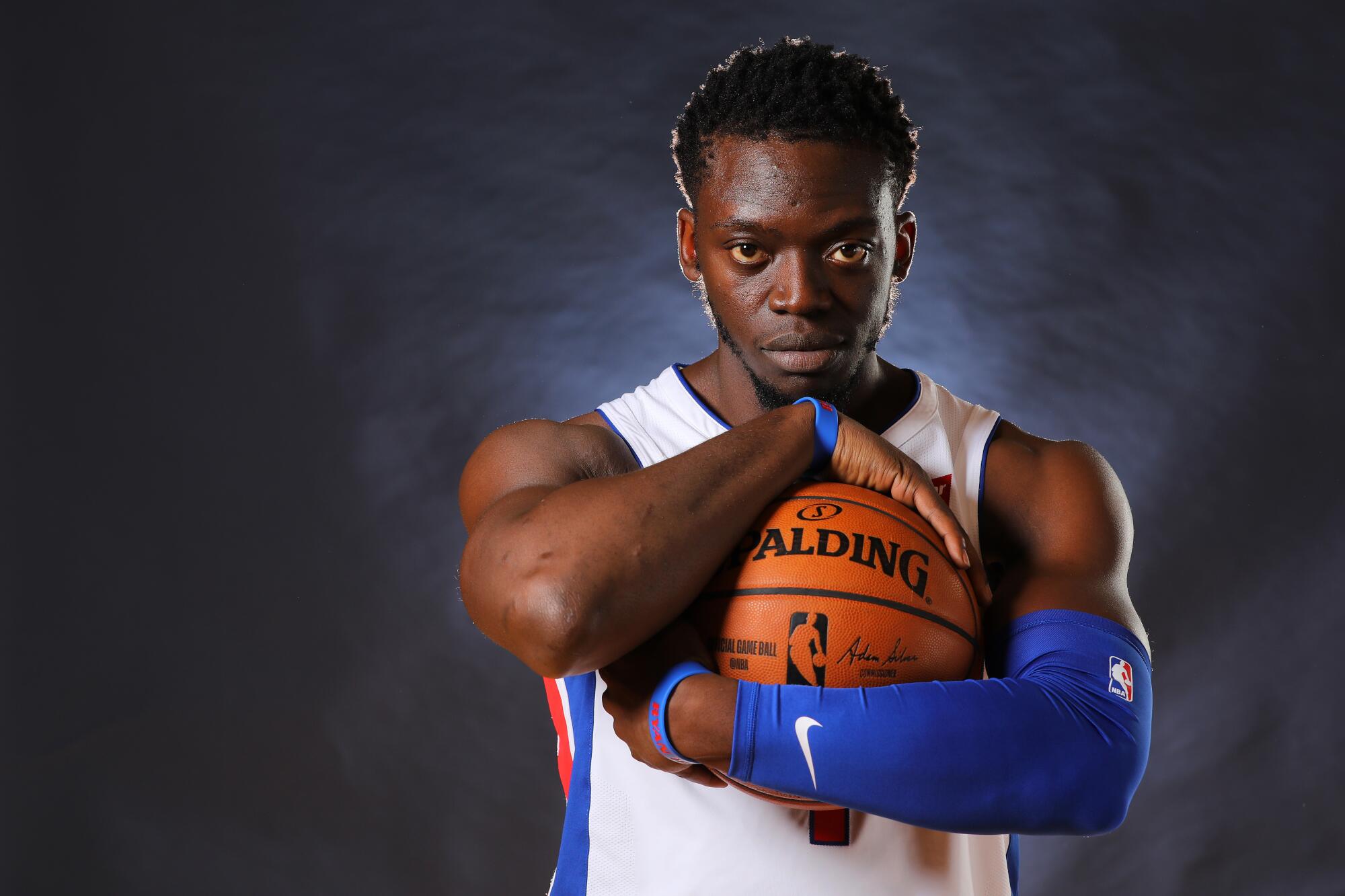
That shadow followed him last year to the sunny skies of Los Angeles, where title contention and a partnership with Clippers star Paul George, one of his closest friends, awaited. It felt like a lifeline. Even living in a hotel room from February until July, as the NBA navigated its suspended season during the earliest months of the pandemic, helped him lose 20 pounds he’d gained while recovering from his back injury. Travis lived down the hallway. They talked for hours about everything.
Games of three-on-three against fellow Clippers reserves last summer, on the practice courts of the Walt Disney World campus near Orlando, Fla., were restorative for his confidence that he could play at the level he wanted.
“I felt the best I ever did when I was in the bubble, but unfortunately I wasn’t playing anymore,” Jackson said.
As the team careened toward a second-round exit, Jackson said his role from game to game was not clearly communicated. The Clippers had stuck together while staying at home, working out together over Zoom and listening to group speakers, but reunited in the bubble, the roster had fractured. Did he really want to do this again?
LeBron James found himself at the center of a maelstrom again with a tweet that has emboldened foes to play the ‘stick to sports’ card.
Against the backdrop of protests against social injustice that rocked the country amid the NBA’s restart, basketball felt small.
“All of a sudden you’re out of the playoffs, you go home and now you’re outside the bubble and you’re confronted with reality,” Travis Jackson said. “Things with social justice are going on, you’re looking at the world and how you feel about it and then, again, the priorities of loving the game. ‘I’m older, I really understand life and, yeah, where do I fit in the world?’ So those were all these things that are now hitting him.”
Returning to Los Angeles after the playoffs, Jackson moved into a home owned by George just outside the city. George, who had endured his own struggles with health and confidence during his first season with the Clippers, wanted his friend to know he had his full support, but gave him space.
“It was a tough situation, and I get it, he was coming into a new team and I was one of the biggest culprits to get him over here,” George said. “It just didn’t pan out last year with him coming over, and so I kind of understood it. I didn’t want to put too much pressure in his situation. I kind of wanted to give him some time just to reflect and see because at the end of the day, it was his decision.
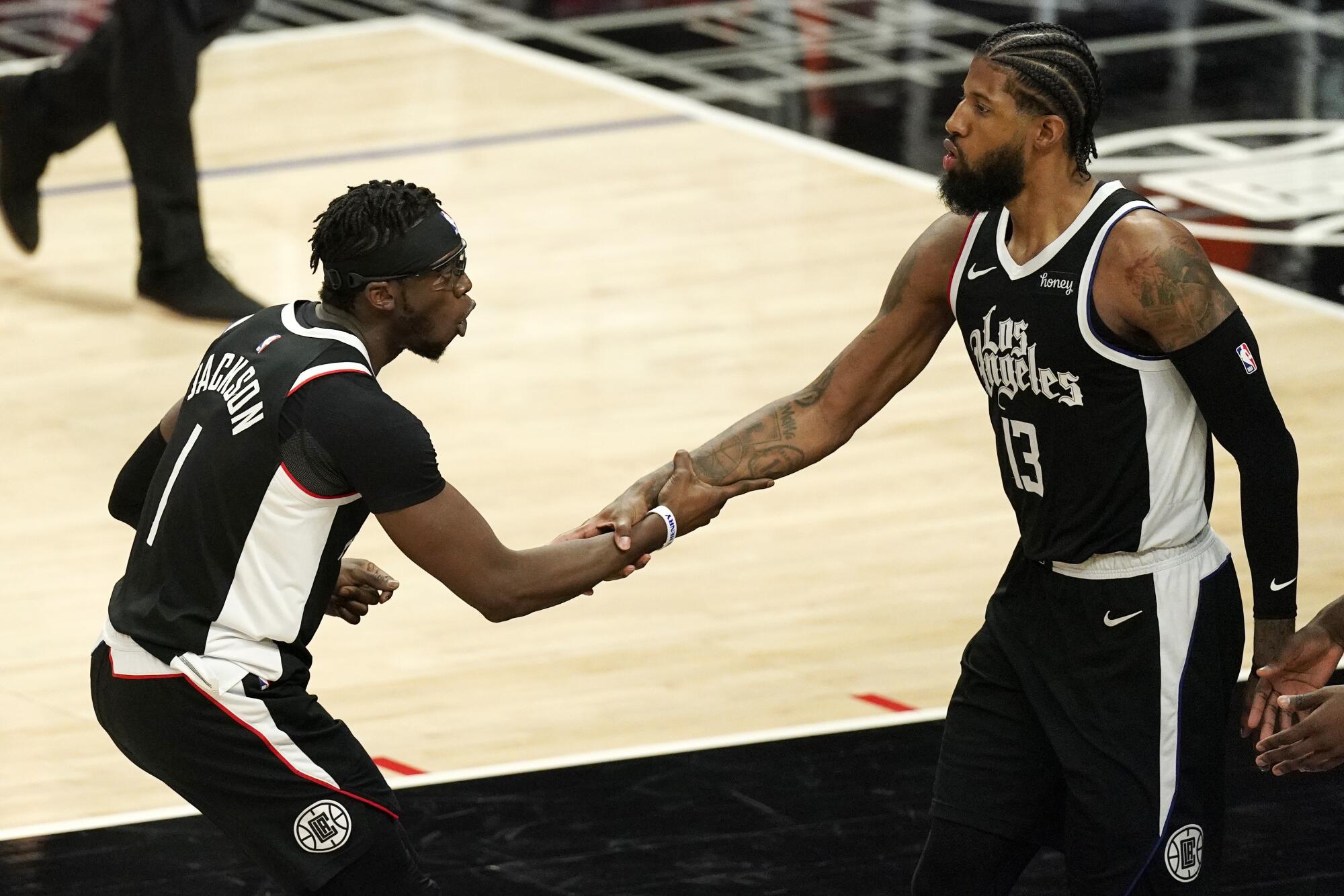
“But then that’s my boy and I know what he’s capable of. He’s one of the best point guards in the league and so I wanted him to come back.”
In early October, Jackson was encouraged when assistant Tyronn Lue was promoted to coach after the team parted ways with Doc Rivers. The opportunity to work with Lue’s assistant Chauncey Billups, a basketball icon in Colorado and NBA champion in Detroit whom Jackson had looked up to since high school, was something he had wanted for years.
Yet “as someone who is quite an introvert,” Jackson said, “I was very much OK just being at home and figuring out the next move from there if there wasn’t basketball this season.” Financially secure, with a frugal streak — he didn’t own a car in Detroit, and whereas some teammates don Prada to games, he prefers hats featuring “Rugrats,” a childhood show — he didn’t feel pressure to return for a 10th season.
In October, with free agency set to start in less than a month, a group of friends visiting Jackson persuaded him to pick up a basketball again.
“I found myself dribbling the ball again and found myself enjoying just shooting,” Jackson said. “Then found myself actually really missing the season. Just talking with them about basketball and calling my brother about it, I found myself really understanding that I still had love.”
Said Travis: “It was a journey to get to that point of him telling me, ‘I’m ready. I know now I want to do this.’
“I can remember after that moment he got back in the gym, almost every other day after that at the Clippers’ facility getting workouts in. Then I knew. I was like OK, he’s back. He’s happy.”
===
Last November, when Jackson met with Lue and Clippers executives during free agency, he was told that should he re-sign, nothing about his minutes or role would be guaranteed.
For a self-described blunt talker, Jackson was more energized that Lue communicated the same way than concerned about the uncertainty. He agreed to a one-year deal.
“He was great,” Lue said. “I just think the communication for him is huge. He handled it the right way.”
Lue’s pitch has held true. After using Jackson in a three-guard lineup off the bench, Lue pulled the plug on the trial after the season’s first 10 games, and though Luke Kennard and Lou Williams stayed in the rotation, Jackson was the odd man out. Lue called Jackson to lay out his reasoning.
When a knee injury sidelined Patrick Beverley for eight games starting in January, Jackson averaged 4.6 assists to just 1.2 turnovers over his next 13 starts. It was a turning point, his decision-making and pace forcing coaches to find room for him in the rotation even when the roster returned to full strength. A career 34% three-point shooter, he’s made 44% of his threes this season and is shooting 48% since the All-Star break. His pace speeds up a plodding offense.
A point guard, like a quarterback, should be judged on wins, Jackson believes: The Clippers are 24-12 when he starts, including 15-5 since the break.
When Kawhi Leonard was a late scratch in Boston in March, Jackson didn’t learn he would start until the national anthem. It didn’t faze him; he scored 25.
“He has always stayed ready,” Lue said.
Travis Jackson understands why the pinch-hitter nature of his brother’s role might appear difficult for anyone, let alone the same player who publicly pined for a larger role in Oklahoma City and started 293 of 299 games in Detroit.
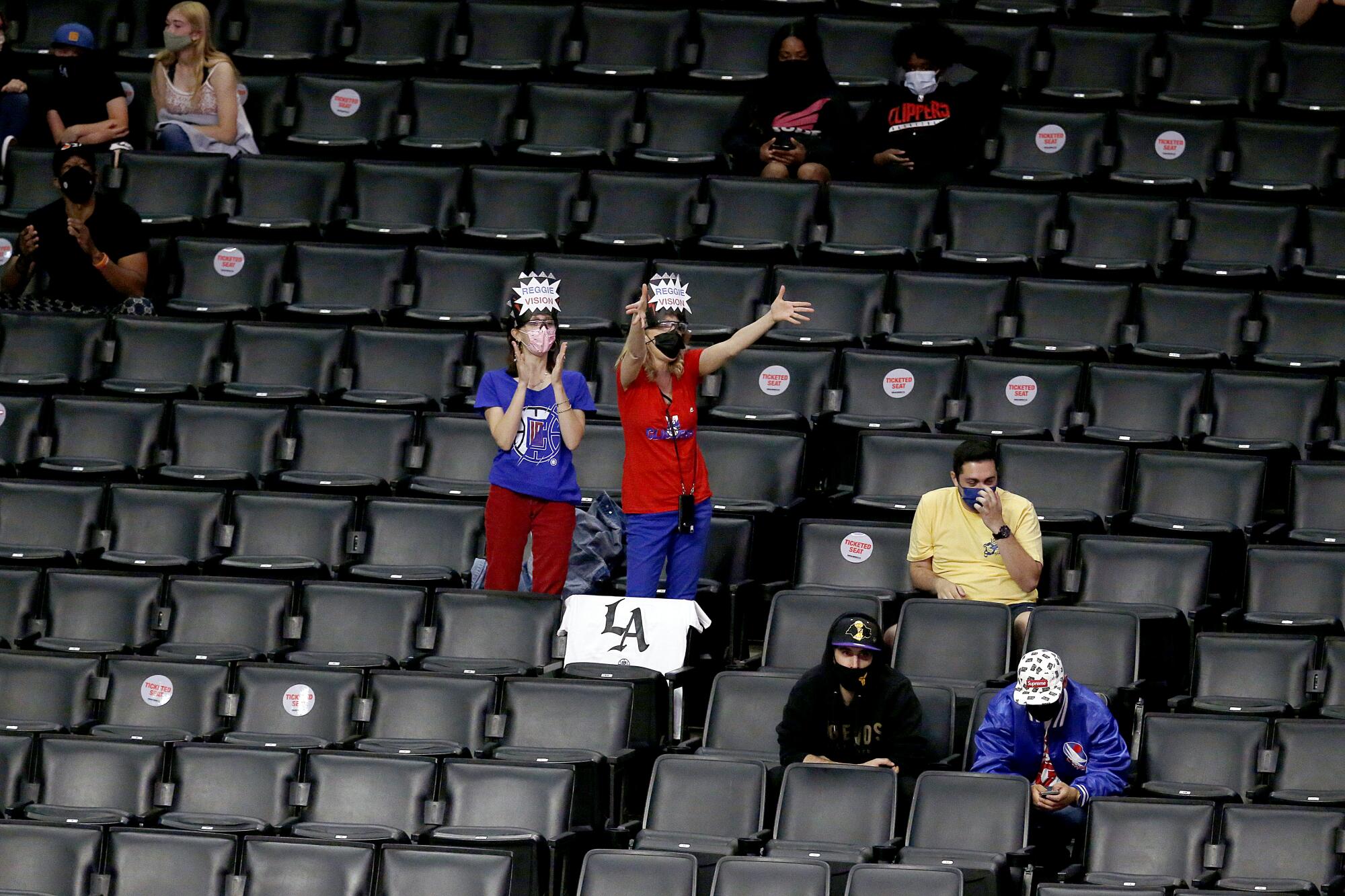
What that overlooks, he said, is that the unpredictability forced his brother to find consistency elsewhere. The result is an approach that is simpler than ever.
“Just be ready for anything and be appreciative of what’s going on,” Reggie said, “and really just re-fall in love with the game.”
Kennard, the Clippers guard who also played in Detroit, has seen the joy return for his former Pistons teammate.
“Before every game and practice,” Kennard said, “he always tells me, ‘Hey, man, just have fun.’”
Jackson would not be in the rotation if he could not still wield the physical gifts that made him a first-round pick as a young man, of course — the downhill driving, his 48% shooting on catch-and-shoot three-pointers. Yet it’s also likely he would not have emerged as an indispensable cog for the Clippers amid their climb to the top had he not re-evaluated his career through wiser eyes now at 31.
Jackson says he is happy as the glue that fills the cracks of the Clippers’ backcourt in part because it took him years to understand why when he looked around the Thunder locker room following their 2012 Finals loss to Miami, his teammates closer to the end of their careers seemed to be so much more emotional than others.
Paul George had 33 points and 14 rebounds and helped the Clippers pull away for a 109-104 win at Houston, L.A.’s 11th victory in the last 12 games.
Title windows, even for teams lucky enough to have two superstars like Durant and Westbrook, or George and Leonard, aren’t guaranteed to remain open.
“I’m just more understanding of how dire it is, and how fragile this business is and how opportunities come,” Jackson said. “You can never guarantee health. You can’t guarantee guys’ mental space being great. You can’t guarantee relationships being great. If you can feel it, if you have a sense that you can do something special, you have to capture it.”
Few know that like Serge Ibaka, the Clippers center who was part of the young Thunder core but didn’t win a title until 2019 with Toronto.
“He really developed his game and then you know, as a person, really got mature,” Ibaka said. “When he came [to the NBA] he was so young and now he’s a real man. Just seeing him growing like this and still play in the league is amazing.”
It takes watching only a few dribbles for Travis Jackson to read how his brother is feeling, a product of watching Reggie play more often than anyone, he estimated. Where he used to see confidence but indecision, he now registers calm — a change that is not limited to Reggie’s play alone. Erratic in the bubble, the Clippers this season play smarter, more ruthlessly efficient and more resilient.
“We’re becoming selfless,” Jackson said. “I think the more that we pick up our brother next to us, the game becomes easier.”
And it was with methodical calm in mid-April, during his first game back in Detroit, that Jackson used his dribble to push his defender backward, until both were a step inside the three-point line. With five Clippers sidelined, it was the kind of night when Jackson’s role expanded instantly. He already had scored 27 points as he rose from 21 feet, dead center in front of the rim, his jumper breaking a tie with 2.8 seconds left.
Jackson once left the court in Detroit questioning his love. After this win, he blew kisses instead to fans. One yelled down, asking for his sweat-soaked jersey. Jackson pulled it over his shoulders and threw it upward, a weight lifted.
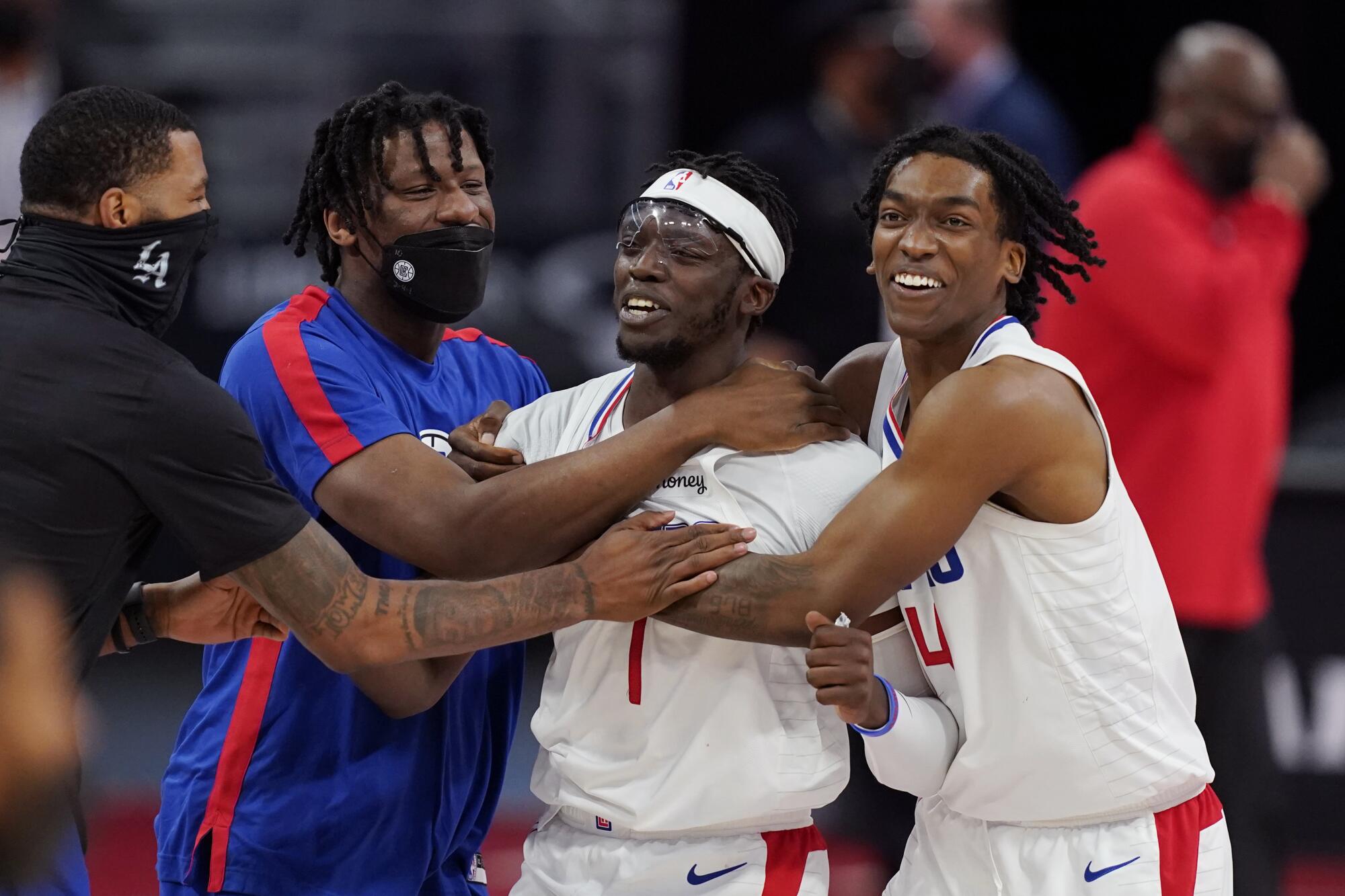
More to Read
Get our high school sports newsletter
Prep Rally is devoted to the SoCal high school sports experience, bringing you scores, stories and a behind-the-scenes look at what makes prep sports so popular.
You may occasionally receive promotional content from the Los Angeles Times.

